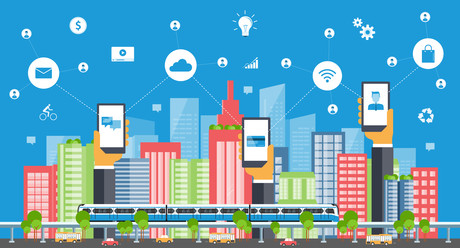Ethics-first builds for smart cities

One of the questions I get asked the most is “what is a smart city?” and when you look, there are a very large number of definitions. Last year, the University of Adelaide identified the need for an engagement and research theme that would bring together projects from researchers across the university, in the areas of improved quality of living, better ways of moving from place to place, sustainability and understanding the ways people live together. For us, a smart city is one where we use the best in technology in conjunction with the resources we already have to improve quality of living and drive economic development.
Like any university, we have a wide range of discipline experts who conduct research that has impact well outside of our walls. It’s a natural fit, then, for our consortium to seek engagement with industry, entrepreneurship and all levels of government. This is a trend that we see across the world: how can we work together to make it easier for us to live with each other? While we say “smart cities”, our definition is relatively loose as it’s improving the ways that communities work that underpins all of this work. Unsurprisingly, with a concentration of people, resource scarcity becomes a serious issue and sustainability, whether through improved monitoring, better recycling or identifying what doesn’t need to be changed, is core to much of our work.
We are actively growing beyond the university campus, with allied researchers at other universities in Australia, and growing collaboration with Smart Cities and Living Labs experts in Europe. Some of the projects we are working on include those that have been funded under the Australian federal government’s $50 million Smart Cities and Suburbs Program, which addresses better use of urban greenspace, applications to help tourists explore and move around councils more easily, and the secure, sensitive and ethical use of data.
In other projects, we’re working on smarter water systems, to reduce flooding through a variety of technologies, as well as the early detection of pipe failures to save the precious water we already have. Our researchers are developing systems to integrate diverse power supplies into systems that will provide uninterrupted and predictable power, whichever generation source is currently in use. The last I’ll mention as a technology, and certainly not the least, is the work on smart mobility, including driverless vehicles and identifying the impact that autonomous vehicles will have on the urban environment.
One of the advantages of a university is that we can have more freedom to examine some of the philosophical issues arising from the use of technology, even as we deliver solid technical solutions to industry. One of these is the ethical impact and considerations around the level of monitoring that may be required to understand what the residents of the city actually want — or what they do. In the context of the new European General Data Protection Regulations, all of our big data work will be developed in the shadow of requirements such as “the right to be forgotten” and “don’t collect just in case it might be useful”. For future exports and for international cooperation, it’s essential that we have a good grip on what is required here. At the Australian Smart Cities Consortium, we’re looking at a lot of projects as being ‘ethics-first’ builds; we try to build systems that will not be prone to ethical issues later on. This includes the level of security and attention we give to storing data, as well as collecting it. If we can make a clear statement about who can see your data, through the careful use of encryption, say, then this will give citizens increased confidence to participate and let us improve systems faster. If we build systems that are secure, ethical, fit for purpose and for the benefit of those people whose data we store, then we are far more likely to have happy users. At the Consortium, we have a strong focus on the stewardship model of data; we never own anyone’s data, we only look after it. This helps us to think about how we can build from that to design systems that will work and not lead to regrettable security incidents in later years.
It’s an exciting time for anyone involved in improving living standards and that’s certainly true for the Smart Cities area. A city that has low consumption, high sustainability, a great economic future and that is good to live in? That’s certainly somewhere I’d like to live.
How to navigate Australia’s new climate regulations
Australia’s new mandatory climate reporting regulations are set to take effect next year,...
A concrete use for carpet fibres
Australian engineers have come up with an unexpected use for discarded carpets: as a means to...
COP29: finance, a "crucial" opportunity and a seat at the table
Leaders and diplomats from around the world are descending on Baku, Azerbaijan, this month for...









